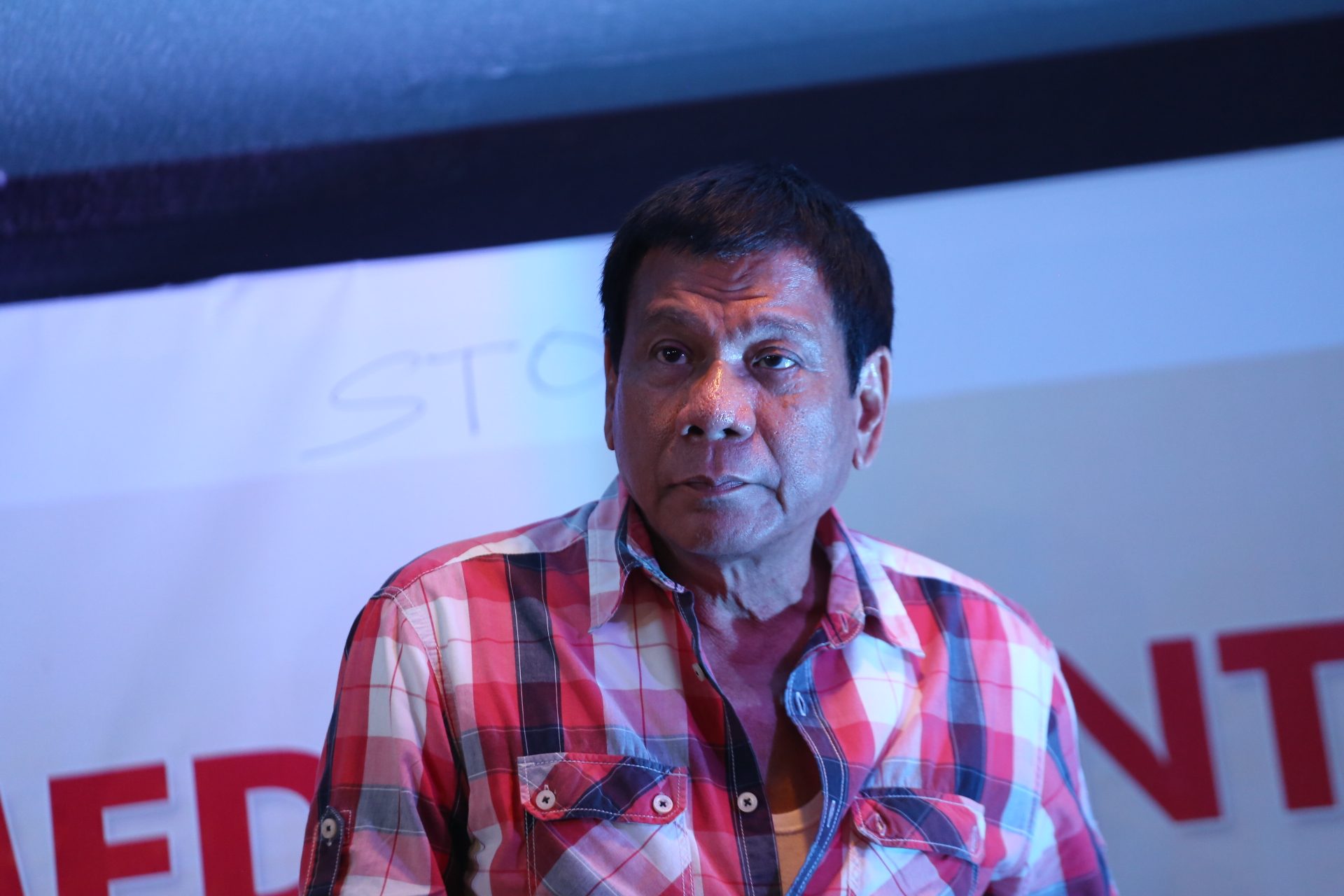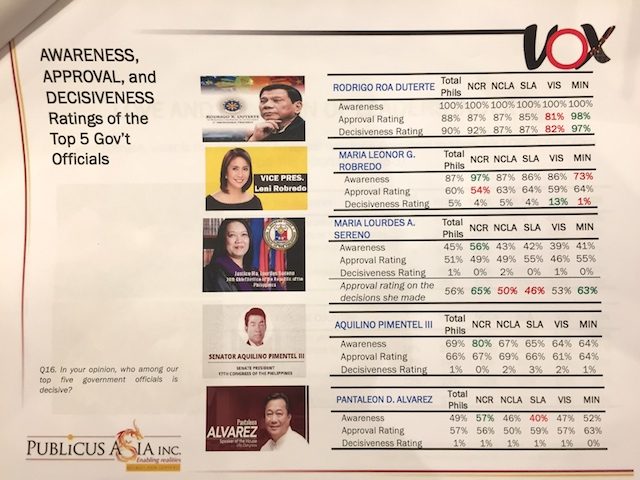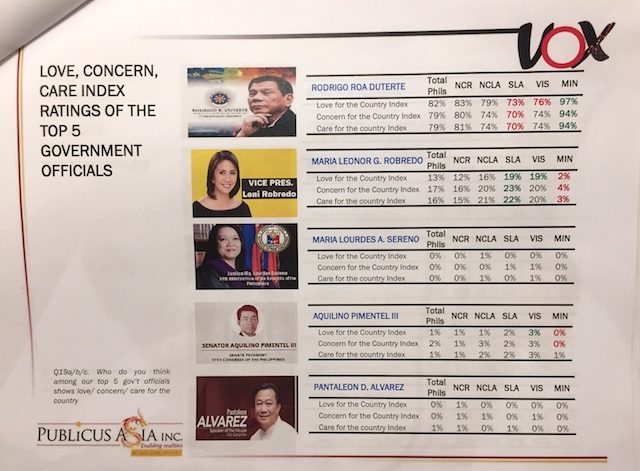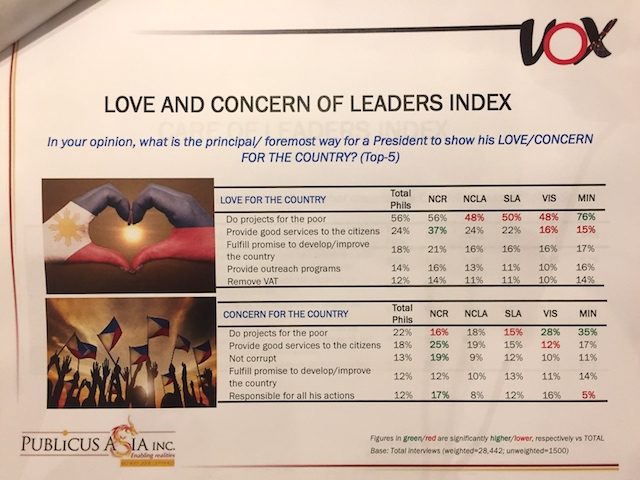SUMMARY
This is AI generated summarization, which may have errors. For context, always refer to the full article.

MANILA, Philippines (UPDATED) – President Rodrigo Duterte is the most decisive among the top 5 officials of government, based on a survey by political management and lobbying firm Publicus Asia.
The results of Publicus Asia’s pilot Pahayag survey showed that Duterte got a 90% decisiveness rating. His rating was more pronounced in Mindanao, where he earned a 97% rating.
Vice President Maria Leonor “Leni” Robredo received a 5% decisiveness rating nationwide, with the highest in Visayas at 13%.
Meanwhile, Supreme Court Chief Justice Maria Lourdes Sereno, Senate President Aquilino “Koko” Pimentel III and House Speaker Pantaleon Alvarez each received a 1% rating.
Survey respondents were asked to choose which among the 5 officials they think is decisive.

“In this day and age, I think decisiveness is the way to go in order to get things moving in this country,” said Publicus Asia founder and chief executive officer Malou Tiquia.
Asked about the low ratings of Chief Justice Sereno, Publicus Asia co-founder Lilibet Amatong argued that the general public either does not know or is not aware of what she or the Supreme Court has done.
Tiquia suggested that the judicial and legislative branches could make more efforts to communicate and explain to the public its decisions and roles.
In a related survey question, Sereno got a 56% approval rating on the decisions made by the Supreme Court.
Duterte also scored high in terms of love, concern, and care for the country among the top 5 officials, getting 82%, 79% and 79% index ratings for each respective item. Again, respondents were asked to choose the one which among the set of officials shows these traits most.

As for approval ratings, responders were asked to assess the performance of the officials separately. Duterte received an approval rating of 88%; Robredo, 60%; Sereno, 51%; Pimentel, 66%; and Alvarez, 57%.
Publicus Asia took a different approach in their independent Pahayag survey in measuring Filipinos’ perception toward their elected leaders.
“We would want to introduce emotional quotient (EQ) into the fray,” said Tiquia. “Intelligence quotient and technical skills are important, but emotional intelligence is the sine qua non (essential element) of leadership.”
Lessons from the 2016 elections, Tiquia added, “would show to all of us that a person who is out of field can actually win the presidency because he showed a lot of EQ.”
Among the last 5 Philippine presidents, Corazon “Cory” Aquino and Joseph “Erap” Estrada got the highest index ratings for love, concern, and care for the country.
“It would appear that if a leader enters the fray in a very emotive, very emotional environment, people connect with them,” explained Tiquia.
Pahayag survey – Among past presidents, Cory Aquino and Erap Estrada get high index ratings for love, care, concern for country. pic.twitter.com/9vxXKgsuTl
— Michael Bueza (@mikebueza) August 28, 2017
Projects for poor, simple life
Many of the respondents also said the best ways for a President to show his love and concern for the country are to do projects for the poor and to provide good services to citizens.

In addition, 93% of respondents said that a caring President “visits the wounded and condoles with those who perished in a calamity,” while 92% described such leader as someone who “takes into account his capacity to serve sincerely,” “looks for the opportunity where he can help his fellowmen the most,” and “takes care of his health so that he can perform his responsibilities to his family and his fellowmen.”
In the Pahayag survey’s Solidarity of Leaders and Citizens Index, 84% said they want to have a simple and comfortable life in the future.
Majority of respondents also want the President and the government to address the issue of jobs (67% of respondents) and education (63%).
The top ways to solve the nation’s problems, said the respondents, are to do projects for the poor (54%), fight criminality (29%), fight graft and corruption in government (23%), enforce programs and laws that will develop the national economy (23%) and address the proliferation of illegal drugs (22%).
The Pahayag survey also asked respondents about other matters such as federalism and Islam.
Conducted from August 7 to 9, 2017, the Pahayag pilot survey has 1,500 respondents from key cities in the country. Its margin of error is 2.58% nationwide, and 5.77% each in the National Capital Region, north Luzon, south Luzon, Visayas, and Mindanao.
Pahayag used a computer-assisted personal interview (CAPI) data collection method via Publicus Asia’s VOX Survey mobile app for faster turnaround time of survey results.
Publicus said the fieldwork using the VOX survey app took only 3 days and the final results with analysis of the Pahayag survey were released in only 11 days, compared to an estimated 30 days from fieldwork to release via traditional paper-based data collection.
Publicus Asia plans to run its Pahayag survey every two months. – Rappler.com
Add a comment
How does this make you feel?
There are no comments yet. Add your comment to start the conversation.